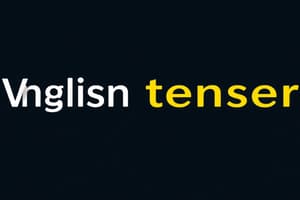Podcast
Questions and Answers
What is the primary function of descriptive adjectives?
What is the primary function of descriptive adjectives?
- To indicate the time of an action
- To describe the characteristics of nouns (correct)
- To show ownership or possession
- To join two independent clauses
Which type of sentence contains two independent clauses and expresses two complete thoughts?
Which type of sentence contains two independent clauses and expresses two complete thoughts?
- Complex sentence
- Passive sentence
- Compound sentence (correct)
- Simple sentence
What is the purpose of the past perfect tense?
What is the purpose of the past perfect tense?
- To describe an action that is still happening
- To describe an action that started and was completed before another action in the past (correct)
- To describe an action that will happen in the future
- To describe an action that happens regularly
What is the term for the arrangement of words in a sentence to convey a meaningful message?
What is the term for the arrangement of words in a sentence to convey a meaningful message?
What is the function of demonstrative adjectives?
What is the function of demonstrative adjectives?
What is the primary function of verb tenses in a sentence?
What is the primary function of verb tenses in a sentence?
What is the difference between the Simple Past and the Past Continuous tenses?
What is the difference between the Simple Past and the Past Continuous tenses?
Which of the following sentence structures is used to describe an action that started in the past and continues until now?
Which of the following sentence structures is used to describe an action that started in the past and continues until now?
Which of the following sentences is an example of the Present Continuous tense?
Which of the following sentences is an example of the Present Continuous tense?
What is the main difference between the Present Tense and the Past Tense?
What is the main difference between the Present Tense and the Past Tense?
Flashcards are hidden until you start studying
Study Notes
English Grammar: Verb Tenses, Adjective Usage, and Sentence Structure
English grammar is a complex system that includes various components, such as verb tenses, adjective usage, and sentence structure. In this article, we will discuss these subtopics in detail, providing examples and explanations to help you understand the rules and exceptions.
Verb Tenses
Verb tenses are used to express the time in which an action or event takes place. There are two main types of verb tenses: past and present.
Present Tense
The present tense is used to describe actions that are happening now or are generally true. It can be further divided into simple, continuous, and perfect tenses.
- Simple Present: Used for habits, general truths, or actions happening now. Example: She sings in the shower.
- Present Continuous (Progressive): Used to describe ongoing actions. Example: She is singing in the shower.
- Present Perfect: Used to describe an action that started in the past and continues until now or is completed at the moment of speaking. Example: She has sung in the shower.
Past Tense
The past tense is used to describe actions that have already happened. It can be further divided into simple, continuous, and perfect tenses.
- Simple Past: Used for completed actions in the past. Example: She sang in the shower.
- Past Continuous (Progressive): Used to describe ongoing actions in the past. Example: She was singing in the shower.
- Past Perfect: Used to describe an action that started and was completed before another action in the past. Example: She had sung in the shower before the concert.
Adjective Usage
Adjectives are used to describe or modify nouns, pronouns, and other adjectives. They can be used in different ways depending on the context.
Descriptive Adjectives
Descriptive adjectives are used to describe the characteristics of nouns. They can be placed before or after the noun they modify, depending on the emphasis you want to place on the adjective. Example: She wore a red dress. (Red is a descriptive adjective modifying the noun "dress.")
Possessive Adjectives
Possessive adjectives are used to show ownership or possession. They are placed before the noun they modify. Example: Her dog barked. (Her is a possessive adjective modifying the noun "dog.")
Demonstrative Adjectives
Demonstrative adjectives are used to point out or describe specific nouns. They are placed before the noun they modify. Example: This book is mine. (This is a demonstrative adjective modifying the noun "book.")
Sentence Structure
Sentence structure refers to the arrangement of words in a sentence to convey a meaningful message. There are different types of sentence structures, including simple, compound, and complex sentences.
Simple Sentence
A simple sentence contains one independent clause and expresses a complete thought. Example: She sings in the shower.
Compound Sentence
A compound sentence contains two independent clauses and expresses two complete thoughts. It can be joined by coordinating conjunctions such as "and," "but," or "or." Example: She sings in the shower, but she also reads before bed.
Complex Sentence
A complex sentence contains one independent clause and one dependent clause. The dependent clause cannot stand alone and needs the independent clause to complete the thought. It can be joined by subordinating conjunctions such as "because," "although," or "if." Example: She sings in the shower because it helps her relax.
Conclusion
Understanding verb tenses, adjective usage, and sentence structure is crucial for writing clear and effective English. By mastering these components, you can communicate your ideas more effectively and engage your readers.
Studying That Suits You
Use AI to generate personalized quizzes and flashcards to suit your learning preferences.




